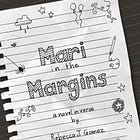You don't need a reason to write in verse
A response to one of the most frustrating things I hear from editors and agents
A verse novel can be adventure fantasy mystery woes romance friendship family foes. The only thing it can’t be is prose.
Hi friends,
As a rhyming picture book author and verse novelist, one of the most frustrating things I hear from people in the publishing industry goes something like this: “You’ve got to have a good reason for writing in verse.”
I’ve heard this multiple times from editors and agents, and it’s aggravating. To me, it’s like telling an artist that she needs a good reason to do block prints instead of watercolor paintings.
A writer, like a painter or sculptor or print maker, is an artist. And she uses her creative skills however she sees fit. And for those of us who are poets as well as storytellers, verse can be a natural way to tell a story. Any kind of story.
The first novel in verse that I ever read was Out of the Dust by Karen Hesse, a brilliant historical fiction novel set during the Dust Bowl. I was really impressed by that book because it opened my eyes to what a powerful storytelling tool poetry could be. I sought out more novels in verse, and soon they became one of my favorite things to read. Eventually I read Song of the Sparrow by Lisa Ann Sandell, which appealed both to my poetic nature and my love of fantasy.
Song of the Sparrow was the book that made me realize that I could write a novel in verse. A novel in verse didn’t have to be realistic contemporary or historical fiction, as my exploration of the genre that far had suggested. At the time, I wasn’t really interested in writing realistic fiction, but I was interested in writing in verse. So, I wrote my first novel in verse. A fantasy novel in verse.
Since then I’ve read plenty of novels in verse that go beyond the realms of realistic contemporary or historical fiction. Books like I Heart You, You Haunt Me by Lisa Schroeder and Forget Me Not by Carolee Dean, both of which have paranormal elements. Books told from animal perspectives like Little Dog Lost and Little Cat’s Luck by Marion Dane Bauer. Then there is Alone by Megan E. Freeman, which in my mind fits into the “speculative” category, being a survival story about a young girl who lives on her own for years after her entire town is evacuated overnight. And I have to mention Bull by David Elliott, which is a verse retelling of a Greek myth. I could go on.
None of these books seem to have a reason for being written in verse. But the verse works. Each of the authors of those books took the verse format and made it work for the stories they were telling. And that is the key.
You don’t need the story to work for the verse, you need the verse to work for the story.
When I was writing that first novel in verse, I wasn’t concerned about whether I should tell the story in verse, but about whether I could tell the story in verse. Could I combine my skills as a poet and a (budding) novelist in a way that worked for this story?
I’ve grown a lot as a poet and an author since writing that first novel in verse, but something the experience taught me is that writing in verse works for me. When I’m writing in verse, it feels right. Stories flow. Characters bloom. Worlds open up. The poet and the storyteller in me work as one.
I can’t tell you how many novels I’ve started to write in prose, but haven’t finished. But I can tell you that when I write in verse, I almost always at least end up with a full draft. I’ve written five novels in verse, each of them stories that I hope to publish one day. And if there is a reason for them to be written in verse, it’s this: The stories wouldn’t exist any other way.
I sometimes think it’s ironic that my first published novel in verse ended up being a contemporary fiction story. Check out Mari in the Margins for the young readers and poets in your life.






This was how I felt writing my first novel-in-verse too. Something opened up in me that won't be put back in the box.
I love this so much!!! I want verse novels with dragons! Verse novels in space!